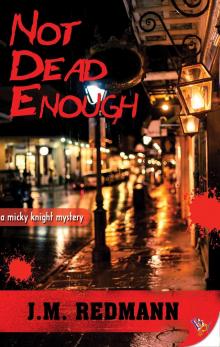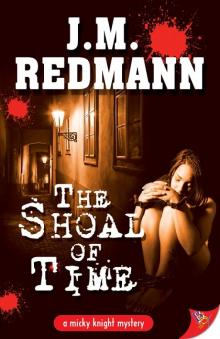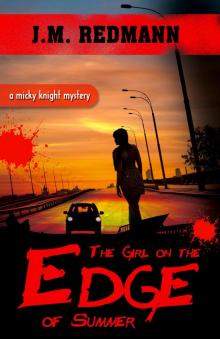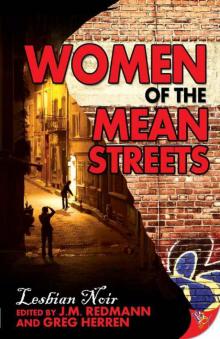- Home
- J. M. Redmann
Not Dead Enough Page 4
Not Dead Enough Read online
Page 4
“Maybe the police do, but I don’t,” Karen protested. Then she saw the look on my face. “You’re going to tell them, aren’t you?”
“I’m not withholding information in a murder investigation. That’s accessory after the fact.” Yeah, I was laying it on thick. But Karen wasn’t weaseling out of this one.
“Look, I didn’t want to get involved in this—”
“Then you shouldn’t have walked into my office and dumped this on my lap.”
“She put your name down!”
“Not by my choice, remember? Karen, there is a con going on. Likely involving a murder, and we’ve both been unwittingly involved. My hunch is it hasn’t played itself out yet.”
“But the woman’s dead. You’ve identified her.”
“If that was their goal, have us ID the body, why did she use one name with me and another with you?”
Karen didn’t have an answer.
I didn’t either. But if their hiring us was to create two disinterested professionals who could say they saw this woman, why change the name? And the story? Aimee Smyth could have hired me to do a title search—claimed she had been burned before and wanted to be sure or some such. It would have been the same story, Karen and I backing each other up. But now we had to contradict each other. The same woman, but with two different names and two different stories. The only reason to put my name on the document was to make sure we linked up.
It made no sense.
That worried me.
My head hurt.
I sent Karen from my office, telling her to bring every scrap of paper she could, even telephone doodles, concerning Sally Brand back as soon as she could.
I stared at my clock, wondering how long it would take her to come back. It wasn’t even lunch yet, and I already knew this was not how I wanted to end my day.
Chapter Four
April isn’t the cruelest month; August is. The heat of the summer has oozed into every crack of the sidewalk, the relief of fall—not until late September or October for us—seems impossibly far away. The glower from the Gulf, its sunburned waters threatening monsters of wind and waves, a waiting game to see which fragile stretch of coast will be hit this time. We constantly scan the reports, following tropical depressions from far out in the Atlantic as if they’re stalkers in our backyard. When you’ve seen what can happen, the worst that can happen, a city underwater, even when it misses you this time, you feel little relief, heartbreak for those it strikes. We wait in the heat and oppressive humidity and hope we’re lucky this year—and that someone else is not.
Karen had brought her stack of papers. I had taken them from her and told her to go away; I’d call when I had something. She obeyed, I’m guessing because she was relieved I wasn’t dragging her straight away to the morgue.
Gawd, I hate real estate. Too much paper, too many words to read. I had read them and read them again, the long day turning to dark before I finally gave up and went home. Even then I took the stack with me as well as my case file, to cross-reference and see if I could tease anything out.
Nothing.
No, plenty of things, but nothing that made sense, nothing that hinted at why they had come up with two conflicting stories and linked us so we would know those conflicting stories.
I had wanted to find something, a hint, a clue, a direction. Something. But the night had closed in and I found nothing.
Now I was back at my desk, staring out the window, delaying what I knew was the inevitable next step. Take Karen (I’d have to take her; I didn’t trust she’d go by herself) to reveal the whole mess, with no answers, just our names sticking out like glowing neon on a dark day, to Joanne. And hope I could explain rationally that this had landed in my lap with the splat that tainted crawfish make as they pass through the stomach.
To complicate matters even more, the check had cleared.
I had been betting that it wouldn’t, a clear con, an obscure out-of-state bank, odds were 99 to 1 against it. Of course it wouldn’t clear. And now the money sat in my bank account, another bad-seafood-in-the-bowels feeling. My client wasn’t answering the phone or emails, so returning it would be difficult. I supposed I could just take the money—something to compensate me for the mess I was now in, but that was ethically dicey. I could also keep working the case—try to find the sister who probably didn’t exist, fail and call it a day. Or I could donate it to a good cause and appease my conscience, if not my bank account. The hipster coffee shop on the first floor paid the rent in hipster time, not bank time, and I preferred not to have to count my pennies to make sure my mortgage checks—home and office—didn’t bounce.
With a sigh, I picked up my phone and dialed Karen’s number. Suppressing an even greater sigh, I told her to meet me here at my office at ten thirty. To her protests, I said it was important, and unless she was dead she needed to be here. She seemed to have matured enough not to argue further.
Then I called Joanne and asked to meet her around eleven a.m., that I had more information on the murder and it was complicated enough to have to do in person. She wasn’t happy either, but agreed.
That made it unanimous—none of us were happy.
I made the strategic decision to meet Karen on the street. She was, as usual, late. Five minutes, but five minutes in the steam bath summer of New Orleans only added to my unhappy meter.
“Where are we going?” she said, when I ushered her to my car.
I was astute enough not to answer until we were seat-belted and in motion.
“You’ll see when we get there,” I answered, coward to the end.
But Karen wasn’t dumb. “I am not talking to Joanne Ranson! She hates me!”
I kept driving.
“If I have to do this—and I don’t think I do—there has to be some other cop besides her to talk to!” Karen gave a dramatic sigh, the cherry on top.
“It’s her case. You have to talk to her about it,” I said, as I avoided a bicyclist going the wrong way while drinking a beer and listening to music on headphones. He had a death wish; I didn’t have a dent-my-car wish.
“Can’t we do a conference call?”
“No. Police like to talk to witnesses in person.”
“But I’m not a witness! I didn’t see a crime. Just your name on a piece of paper.”
“Your client and my client are missing. There is a dead woman in the morgue who fits the description for both of them.”
“But you ID’ed her as your client.”
“As someone who could have been my client. Or her sister,” I pointed out, now at a red light long enough to look at Karen. “Besides, Joanne will be professional about this. She’ll ask questions. You answer them honestly and then it’s over.”
We both knew I was lying.
But I kept driving.
Karen pouted. “But she’ll tell my cousin.”
I knew who she was referring to. I ignored the bait. “So? You’ll get points for doing your civic duty.”
“I will get a lecture about not getting involved in grubby murders. I mean, that’s why she dumped you, isn’t it? Tired of the dime-store-novel messes you got into.”
Ten years ago, no, maybe even five, I would be screaming at Karen, telling her she was a fucking idiot and other boring, clichéd insults. Now I was mature enough to hold my tongue, understand she was attacking me because she felt attacked. And to know that I’d get her back, but at a time of my choosing, not hers. Cold anger is much more dangerous than hot anger—it has time to think.
“You’re too young to have ever been to a dime store,” I replied, aiming for an annoyingly placid tone in my voice, and again looking at the road, one hand on the steering wheel, the other changing gears. Another reason to drive a manual car besides discouraging thieves who can’t drive a stick—it occupies both hands, making it harder to wrap them around annoying passengers’ necks.
“You know what I mean,” she retorted.
“I know you mean to piss me off and make this as fuckin
g difficult as you can, typical spoiled child.” Ah, yes, a moment of keeping calm allows you to pick where to stick the knife.
“You fucking bitch! You don’t know anything at all about my life!”
“I know you’ve always had a lot more money than I’ve had. I know you’ve never been hungry. I know you’re careless with people and what happens to them after you’re done.”
“Fuck you!” Then she started crying. Not gentle tears of manipulation, but heaving sobs. Genuine emotion. But I couldn’t tell which one—hurt that I wasn’t playing nice, or her life wasn’t its usually glossy finish? Or had I wounded her, too close to a truth she tried to hide?
Or something else that had nothing to do with this, except today was the trigger.
I found a napkin in my door pocket and threw it in her lap.
Whatever Karen was crying about, I couldn’t fix it. Even if it was something I said.
Parking was not kind around Joanne’s station. I ignored Karen’s dabbing at her face with my crumpled napkin as I cursed a jerk who took two spaces.
“Why do you have to be so mean?” she asked quietly as I finally found a place two blocks away.
“Maybe I’m not mean, just honest.”
“Really? You think you’re different, but you’re not. Judging, always judging. Making sure your way of life is better than anyone else’s. You, and Joanne. And Cordelia. You’re so much better than I am. So sure you are.”
“No, different. That’s all,” I mumbled, surprised by her naked honesty. It was the last thing I expected from Karen Holloway.
“Oh, please, you never look beyond your superiority, like it was something handed to anyone and I don’t have it only because I chose not to.”
“You have made your choices, Karen,” I pointed out.
“That’s what I mean! You made those choices, too, but you had someone—someone who mattered—tell you that you were strong enough and smart enough and brave enough. I never had that. I was told I could be pretty, but not smart and not strong and certainly not brave. My mother was a trophy wife and I was raised to be just like her. ‘Shut up and be pretty, Karen.’ ‘Your brother has opinions; you have a smile.’ You didn’t grow up like that.”
“No, I didn’t,” I retorted. “I was raised by a hellish religious aunt after my father died.”
“What about those stories of you fighting alligators on the bayou? Off on your own in a boat.”
“Not that big a deal. No alligator fighting, just gliding by them as they sunned.”
“On a boat by yourself.”
“A small skiff, no more than a mile from home.”
“I wasn’t allowed to be on those little paddleboats in City Park by myself. My legs weren’t strong enough, they said. I believed them. For a long time. On my own? Even a small skiff, even less than a mile from home? Not possible. Not even in the dreams I was allowed. I never got to find out I could glide by an alligator and come home safe on my own. The best things money could buy didn’t make it less a cage.”
“I’m sorry,” I said. “None of us get dealt a perfect hand.”
“No, we don’t. I thought I had everything I needed—a new car, expensive clothes. Anything money could buy. It took me a long time to see how crippled that comfort made me. You, Joanne, Cordelia, all your friends. The things you do in your everyday life terrify me. I can’t find missing people, or heal a wound, or arrest someone—there are too many voices in my head telling me I can’t do any of those things.”
“Then stop listening to those voices.”
“I tell myself that every day. On a few days, I take a step farther than I ever have before.”
Karen was right. I had judged her as if she could and should live my life, never considering the unseen damage done by her lavish cage. But she was the only one who could repair it. The best I could do—and it wasn’t much—was to be kinder and less judgmental.
And we still had to talk to Joanne.
“I’m sorry, Karen. There were many things I was told as a child, harmful, vicious things, but not that I couldn’t be strong and smart. But none of us can change the past.”
“I know. But I don’t want to do this in a way I don’t think you’ll ever understand.”
“No, probably not. But I’ll do my best to keep Joanne focused on neither of us did anything wrong.”
I opened my door, letting the heat blast in.
We walked the two blocks silently.
I hoped that Joanne would at least make us wait long enough for most of the sweat to dry; it was dripping down my nose after the first block. But no, she had to be prompt, ushering us into her office almost the minute we arrived.
She gave Karen an appraising look, then pushed her glasses up and looked down at the papers on her desk, doing her best to deny me a clue as to what she was thinking.
“A woman claiming to be Aimee Smyth hired me to find her missing sister, Sally Brand. Someone named Sally Brand just put money down on a house but failed to show at closing and, for reasons neither of us can figure out, put my name in her paperwork as the contact of last resort.”
At Karen. “You’re the Realtor?” Not really a question.
Karen just nodded.
Joanne looked at me. “And she contacted you first?”
“Yes. My name was in her paperwork. She had no reason to suspect anything criminal at that point. Only when we got together and compared stories—”
Joanne cut me off. “You identified the body as that of your client.” A statement, but with a question lurking in it.
“I identified her as someone who looked like my client—a woman I met only once—and who had clothing and jewelry like my client wore.”
Joanne threw questions at us, rapid fire, everything from the minute-by-minute time line to when we’d met with Sally/Aimee to the details of Karen’s real estate license.
I could see why Joanne was doing this, why she had to go over every detail. This case had gotten a whole lot more complicated. It wasn’t just a dead woman now—maybe a tourist who’d taken a wrong turn into tragedy. Find a hopped-up robber, probably a kid who panicked. Ugly, sordid, but not complicated. Instead of finally having some idea of who this woman was, now everything was up in the air. Did Aimee Smyth or Sally Brand even exist? If so, was one of them the dead woman? And why this elaborate setup? Put money down for a house, give me a check that cleared (yes, I admitted to that. Joanne merely grunted in reply).
Karen had started out nervous, and now every question Joanne threw her way hit her like a jolt. Her hands were everywhere, smoothing her skirt, fiddling with her phone, brushing her hair back. Now they were starting to shake. I’m sure Joanne was aware, but she didn’t pull back. If anything, it made her push harder, aim more of her questions at Karen. Who drove to the house? Who else was there? What was she wearing? What did she say to Karen? What ID did she provide? Why hadn’t she done a better background check? I tried to answer when I could. Or at least remind Joanne that we did all the normal things that people do, and most of the time it turns out okay. We didn’t know we were dealing with criminals. By the third time I mentioned this, Joanne gave me a hard stare, told me she was aware, but a woman was dead and we were involved. Like it or not, she added, as if she knew I was about to point out we didn’t ask for this.
Our eleven a.m. meeting slid past one p.m. I finally demanded a bathroom break. Reluctantly, Joanne gave it to us, but she walked with us both to the toilet and waited outside the door. I wasn’t sure if this was standard, she just wanted to stretch her legs but had a bladder of steel, or if it was another tactic to rattle Karen. Or all of the above.
When we came back to her office, she sat staring at her notes for a long time. Finally, she said, “I need you to look at the body.”
Karen blanched. “No, can’t I just look at a picture?”
“No,” Joanne answered. “We need to know if we’re dealing with the same woman or if your buyer is different from Micky’s client.” With a barely perc
eptible softening, she added, “I’m sorry, I know this isn’t pleasant, but we need to know.”
I chimed in. “It’s quick, only a minute or so.”
“Mick, I need you to go with her. I want you both to look at her and see if you see the same woman.”
“I don’t know if I can add—”
“It’s quick, only a minute or so,” Joanne echoed, not even smiling as she captured me with my words. “We really need to verify if this is the same woman or two different women.”
I saw her point but fervently did not want to return to the morgue.
Cutting off our last escape, she called in a patrol officer to drive us there.
Reluctantly, I followed the patrol officer, behind him to let Karen follow me. I didn’t want to see the look on her face. I only knew she was still following from the sharp tap of her heels on the linoleum floor.
But he ushered us both into the back seat, not trusting either of us to be up front where the shotgun and radio were.
“This is the last time I do the right thing,” Karen huffed as I slid in beside her.
“You and me both,” I muttered, although I suspected we were better off with Joanne aware of the mess we were in. I couldn’t see through to why they were doing this—what was the payoff? What did they gain? And why involve both me and Karen?
The car jolted over a pothole. New Orleans’ Finest didn’t include the back seat accommodations.
New Orleans, alas for trips like this, is not a large, spread-out city.
We were parking at the morgue before I even thought to look for the lip balm to rub under my nose. Now I couldn’t do it without being obvious. I found a tube, this time tart cherry cola, and offered it to Karen.
She gave me an odd look.
“To rub under your nose.”
She gave the tube an odder look. “I don’t think tart cherry is going to help.” And she waved it away.
I put it back in my pocket, not wanting to look like the wimp who needed it to get through only a few minutes at the morgue. Tart cherry isn’t my favorite flavor anyway.

 Not Dead Enough
Not Dead Enough Ill Will
Ill Will The Shoal of Time
The Shoal of Time The Girl on the Edge of Summer
The Girl on the Edge of Summer Women of the Mean Streets
Women of the Mean Streets J.M. Redmann - Micky Knight Mystery 7 - I'll Will
J.M. Redmann - Micky Knight Mystery 7 - I'll Will